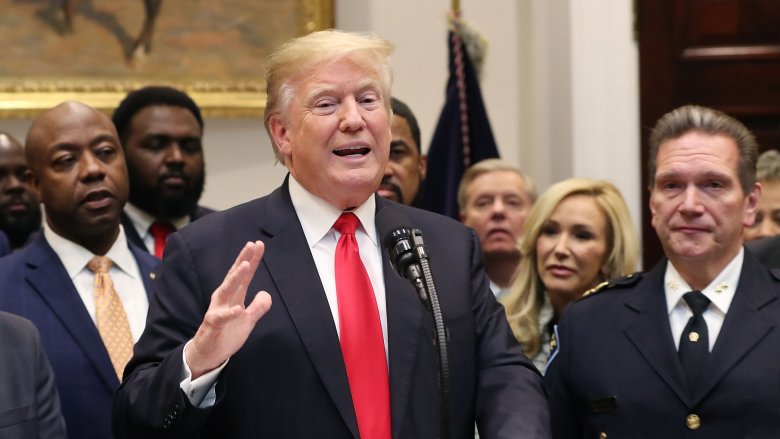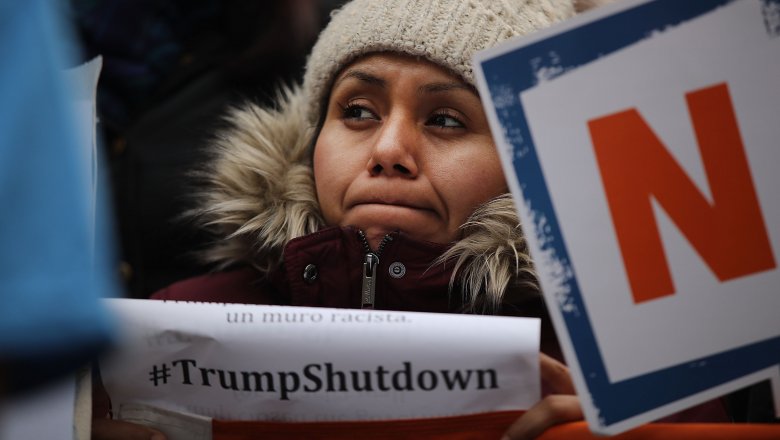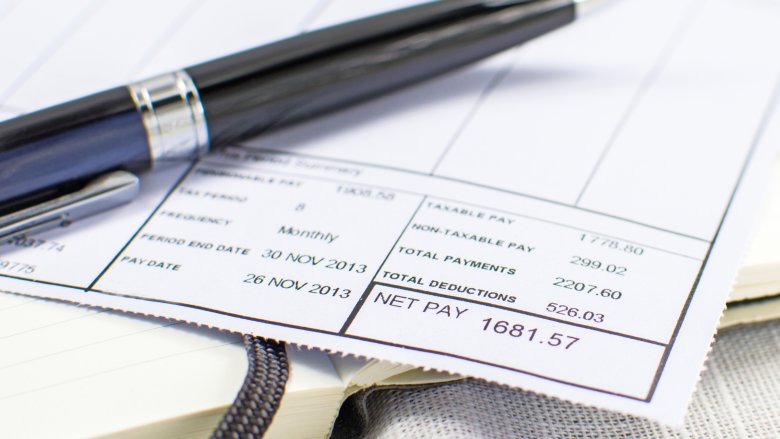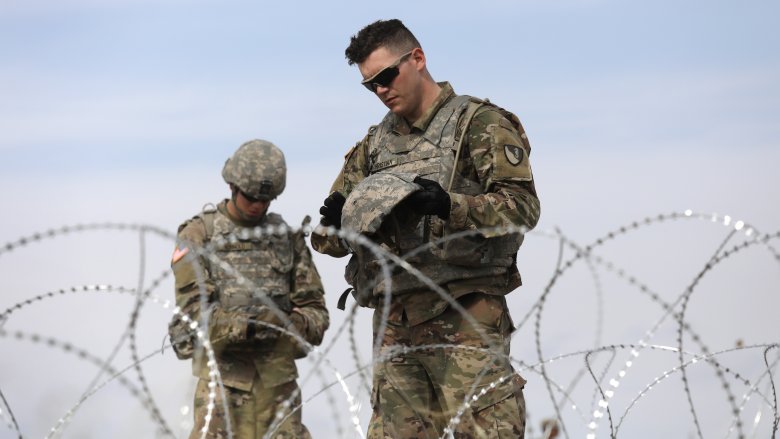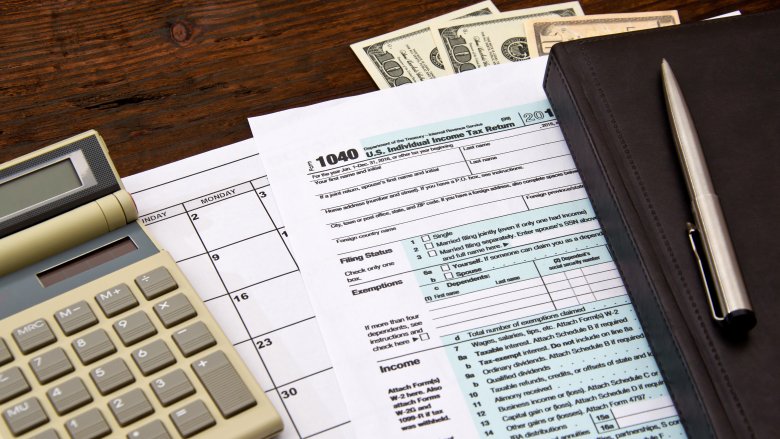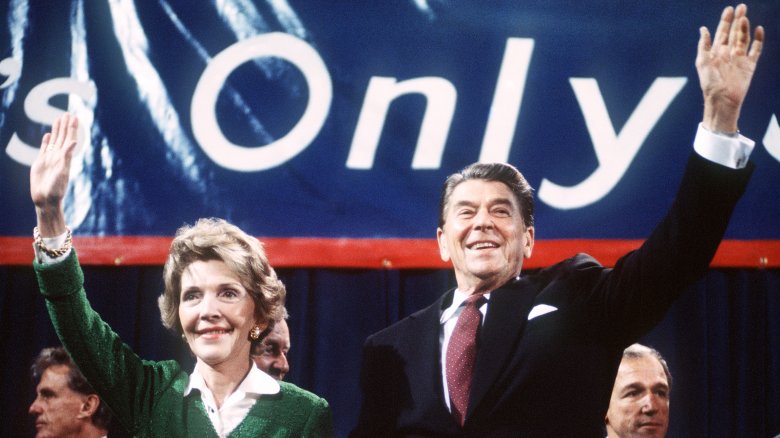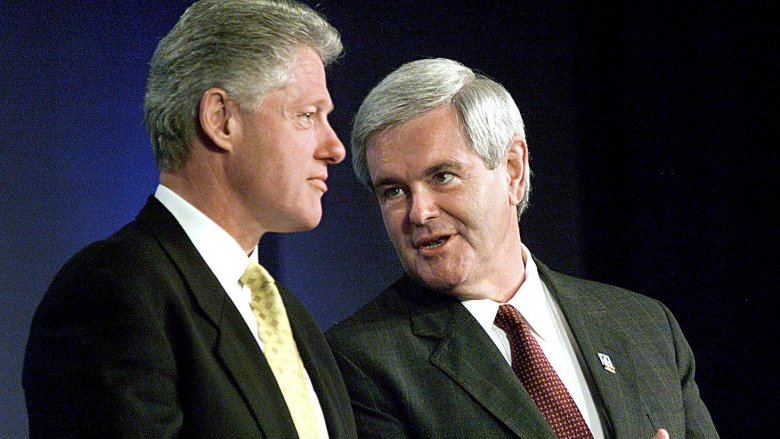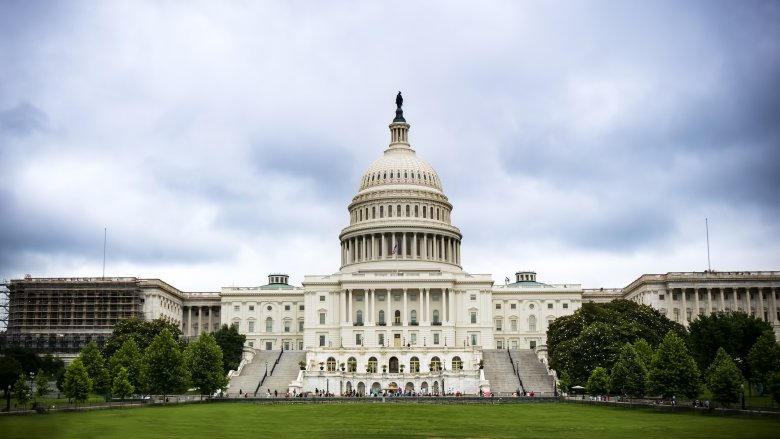What Really Happens When The Government Shuts Down
Every year, Congress needs to approve a federal budget and the president has to sign off on it. The budget says how much cash each department gets for the next year. Of course, Democrats and Republicans tend to have different ideas about where government money should be spent. Usually they manage to hammer out their differences, but when they can't agree, we're faced with a government shutdown.
Trump has already seen the country come to the financial brink a few times. In January 2018, there was a 69-hour shutdown, but it was mostly over the weekend and wasn't that disruptive. The next month saw a 9-hour funding lapse. And Trump tweeted in March that he was thinking of vetoing a spending bill and forcing another shutdown. This shocked a lot of folks because shutdowns are not something presidents usually do lightly. In the end, he didn't do it.
And like a nightmare that just won't quit, this will probably just keep happening, with or without Trump. Trump signed a stopgap measure in September that delays the problem until December, but with a lame duck Congress, we might be facing an extended shutdown soon. Here's the skinny on government shutdowns.
Workers find out if their job is 'essential' or not
Sometimes it's hard to drag yourself out of bed in the morning. You start having an existential crisis. You work 40 hours a week and for what? Are you making a difference? At least when you work for the U.S. government, you know you're an important part of making this great country function smoothly. You're literally responsible for the freedom people enjoy every day.
Except during a shutdown, you might find out your job is kind of pointless. At the very least, that you are "nonessential" to the running of the United States. Jobs are deemed essential or not, and if you're not, you stay home. According to Time, during the 2013 shutdown, 850,000 government employees were told the country could totally survive with them sitting on a couch watching TV for 16 days. It must be hard to go back at full steam after that kind of realization.
On the other hand, if the work you do is declared essential, you have to show up even though all government work has technically stopped. Air traffic controllers, for example, are required to report as normal because planes have a tendency to fly into each other without their help.
No matter if you're essential or nonessential, a shutdown is seriously inconvenient because you don't get paid. So whether you show up for work or don't get out of your pajamas, you might not be able to make rent. Sometimes shutdowns stretch on for weeks.
People do eventually get paid, theoretically
While all government employees might have to pinch pennies for a while, in the end they have always gotten their money.
Congress knows making people come to work for no pay will make them look bad, so according to CNN, once the funding bill is hammered out they have always reached an agreement to pay everyone backpay, whether they stayed home or not. This is good news, but it's also by no means guaranteed. There isn't any sort of law requiring it, so it's a new gamble every time — probably not a risk those employees enjoy.
Of course, the individuals you should really worry about are those elected officials who work day and night during the shutdown trying to fix the problem they themselves started, right? How can they even afford food during this difficult time if they don't get their paychecks? Well, funny thing. Thanks to the knock-on effects of laws they made themselves, members of Congress all still get paid during a shutdown. They have considered changing that law and amazingly haven't gone through with it. But the hardworking staffers who assist them at these times? Nope, they're working around the clock for free until their backpay kicks in. Some members of Congress know how bad this makes them look and have donated their shutdown paychecks to charity.
Keeping people healthy is NOT essential for some reason
Whoever decided which government services were essential made some interesting choices. You would think, for instance, that anything involving keeping people alive and healthy would be pretty vital. But no.
According to Business Insider, the 1995-96 shutdown (which lasted four weeks) saw the Department of Health and Human Services stop taking applications for Medicare. This meant 10,000 people who were possibly in desperate need of health insurance were put on hold. Since then this lesson has been learned, but other choices are still baffling.
The Environmental Protection Agency ceases inspections, including "sites that included hazardous waste, drinking water, and chemical facilities" because what's a couple weeks of potentially toxic tap water? The Hill says the National Institutes of Health continues to care for the cancer patients they already have, but during a shutdown they can't admit anyone new. So good luck if you have cancer and were hoping the government could help. The Centers for Disease Control has to stop doing important flu season-related work. It is also unable to keep tracking disease outbreaks. Meanwhile, the Food and Drug Administration has to cancel the majority of its food safety, nutrition, and cosmetics activities, including routine food safety inspections. (Have fun eating the month after a shutdown.)
The military still does its thing
When it looked like there might be a shutdown in January 2018, Trump tweeted repeatedly that this was a terrible idea because it would be "devastating" to the military. This wasn't entirely true, as most military folks still had to show up to work (but yes, without pay). It also contradicts his statements on shutdowns under Obama, when he tweeted that they were totally necessary and not a big deal.
The thing is, the military is deemed absolutely essential during a shutdown. The only people who stay home are some of the civilian personnel. The military is maybe the least affected area of the government during these times. After Trump threatened a shutdown in January, the Department of Defense was quick to reassure people, saying things would go on as normal, especially when it came to the war in Afghanistan and the quasi-war military operations in Iraq and Syria. The Defense Secretary said only after a "sustained funding impasse" would the effects start to be seen, and even then it would just be some grounded aircraft and ships skipping maintenance.
Even veterans are barely affected. Most Department of Veterans Affairs staffers are deemed essential, benefits still go out, and the VA hospitals continue on as normal. The Border Patrol is also considered essential and keeps up its regular schedules. In January, they released a statement saying no matter what happened they would continue to keep "communities safe."
The government loses a bunch of money
While national parks are lovely, you can see why they and their staff would not be considered essential during a government shutdown. But they also make a lot of money for the government, so when they shut down for weeks, the country misses out on a lot of cash.
Reuters says during the three-week 2013 shutdown, the government lost 750,000 daily visitors to national parks and the Smithsonian complex. This resulted in $500 million in lost revenue. It also really pissed people off who were surprised on their vacations. So according to the Hill, when it looked like we were heading into a shutdown in January 2018, the Trump administration announced they were desperately trying to find a way to keep them open. The Interior Department was especially concerned about Washington D.C.'s various war memorials remaining accessible to the public.
The National Zoo is also considered nonessential during a shutdown, but the zoo animals still get fed because no one could be that evil. So while you can't see them (even the famous Panda Cam is shut off), at least you know they aren't starving to death in there. Shutdowns cost the government money in other, less concrete ways as well. PBS reports that the 2013 shutdown resulted in 6.6 million days of work lost, and more than $2.5 billion in lost productivity.
But will it affect ME?
It might take a government shutdown for you to realize how much you actually depend on the government. But you could conceivably get through a long shutdown without even noticing. It just depends what your immediate needs are.
Since shutdowns usually happen at the beginning of the year, the Hill says the thing that will affect the most people (and seriously piss them off) is the potential for tax returns to be delayed. Most IRS employees are considered nonessential, even during tax filing season. While the employees that do stick around will work on processing tax returns, they aren't going to waste time cutting any checks. If you want a passport, you're relying on the State Department. In 2013, it continued processing applications, but this isn't normal. Maybe submit your application sooner rather than later.
And considering the number of mass shootings, maybe it's a good thing that the government won't be issuing gun permits during a shutdown. Other government programs will also delay accepting applications. This means if you qualified to start receiving Social Security checks during the shutdown, you'll have to wait a bit longer before getting the money the government owes you for paying taxes all those years.
However, if you're already signed up for any kind of benefits, you'll still receive them. The government can't leave you completely high and dry even when they're stripped to the bare bones.
Shutdowns are a relatively recent thing
If you know your American fiscal history, you might notice that budget shutdowns didn't happen before 1980. According to Business Insider, that's because they only came about after the budget process was overhauled in 1974. Things went okay for a little bit, then it all went crazy.
In 1980, the FTC had to shut down for one day when Congress failed to pass an appropriations bill that ensured their funding. The Washington Post reported it was the first time a government agency ever shut down due to a budget dispute.
Shutdowns as we know them started in earnest in 1981. Time says before then when there was a funding issue government agencies simply kept going as normal and expenses were covered retroactively. Then Jimmy Carter's attorney general made it so government work had to stop until Congress agreed to pay for it. Theoretically, employees can go to jail for working during a shutdown. But even in the 1980s, shutdowns used to be less crazy. The earliest ones rarely lasted longer than a few days, and staff were not usually furloughed. It wasn't until 1990 that the practice became to shut the government down for every single funding gap and send nonessential people home.
There have been some pretty crazy shutdowns
Depending on how you count them, there have either been 12 or 18 government shutdowns before 2018. The difference is down to six funding gaps not actually affecting the functioning of the government at all, according to Vox. Some people don't think those times were really shutdowns, since nothing ... shut down.
The other ones varied in intensity. Regan saw a record eight shutdowns during his time in office, but none lasted more than three days. One of them happened by accident. On September 30, 1982, Congress missed the deadline to approve funding that everyone had already agreed to ... because everyone had social engagements that night. Regan was holding a barbecue, and the Democrats had a major fundraising dinner. So nothing was funded until the weekend was over.
The most ridiculous shutdown was the one from December 5, 1995, to January 6, 1996. There had just been a four-day shutdown the month before, but that didn't stop anyone. The longest shutdown in history, it happened because of a tedious argument over whether to use the economic forecasts from the Congressional Budget Office or the Office of Management and Budget to determine how good Clinton's plan was. That's it.
In 2013, the shutdown came down to Ted Cruz. He was determined to delay Obamacare and was willing to make sure the government shut down over it. Republicans eventually backed down.
America is the only country in the world where this happens
If you're wondering why you never hear anything about, say, Germany having a government shutdown over finances, that's because they don't. In fact, pretty much no other country in the world does something this stupid. Slate points out that this is because most of the world's successful democracies have parliaments. Under that system, if a budget isn't agreed on, the parliament is dissolved and elections are held so the people can elect leaders who will actually get something done. They aren't beholden to elections every two years like we are. In 1975, the Queen Elizabeth II fired everyone in Australia because that is actually a thing.
Obviously, other countries still have issues, they just deal with them more sensibly. Belgium holds the record for most time without a government at 589 days, which occurred in 2010-11. But this didn't mean people went more than a year and a half with only the most basic government services. The country just kept going normally while a "caretaker government" passed a budget, held the presidency of the EU, and bombed Libya.
Even when countries with presidents, like France and Brazil, have budget issues, they don't sweat it. The French constitution specifically says stuff still has to be paid for. Brazil failed to pass a budget in 2006 but kept paying salaries as normal. And the U.S. functioned the same way before 1980. All this means that foreigners are "bemused" by the U.S. approach to federal budgets. It might be time for a rethink.
